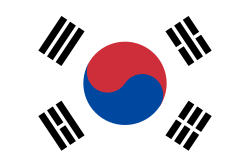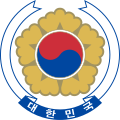
Back Аладатәи Кореиа Abkhazian Korèa Tunong ACE Suid-Korea Afrikaans Südkorea ALS ደቡብ ኮርያ Amharic Korea, south AMI Corea d'o Sud AN Suþcorea ANG दक्षिण कोरिया ANP كوريا الجنوبية Arabic
Republic of Korea | |
|---|---|
| Anthem: 애국가 Aegukga "The Patriotic Song" | |
National seal: | |
 Territory controlled
Territory claimed but not controlled | |
| Capital and largest city | Seoul 37°33′N 126°58′E / 37.550°N 126.967°E |
| Administrative center | Sejong City[a] 36°29′13″N 127°16′56″E / 36.487002°N 127.282234°E |
| Official languages | Korean (Pyojuneo) Korean Sign Language[1] |
| Official script | Hangul |
| Ethnic groups (2024)[2] | |
| Religion (2024)[3] |
|
| Demonym(s) | |
| Government | Unitary presidential republic |
| Han Duck-soo (acting) | |
| Han Duck-soo | |
| Woo Won-shik | |
| Cho Hee-dae | |
| Moon Hyungbae (acting) | |
| Legislature | National Assembly |
| Establishment history | |
• Gojoseon | October 3, 2333 BCE (mythological) |
| 57 BCE | |
| 668 | |
• Goryeo dynasty | July 25, 918 |
• Joseon dynasty | August 13, 1392 |
| October 12, 1897 | |
| August 29, 1910 | |
| March 1, 1919 | |
| April 11, 1919 | |
| August 15, 1945 | |
• US administration of Korea south of the 38th parallel | September 8, 1945 |
| August 15, 1948 | |
| February 25, 1988 | |
| Area | |
• Excl. North Korea | 100,363[4][5][6] km2 (38,750 sq mi) (107th) |
• Water (%) | 0.3 |
| Population | |
• 2024 estimate | |
• Density | 507/km2 (1,313.1/sq mi) (15th) |
| GDP (PPP) | 2024 estimate |
• Total | |
• Per capita | |
| GDP (nominal) | 2024 estimate |
• Total | |
• Per capita | |
| Gini (2021) | medium inequality |
| HDI (2022) | very high (19th) |
| Currency | Korean Republic won (₩) (KRW) |
| Time zone | UTC+9 (Korea Standard Time) |
| Date format |
|
| Calling code | +82 |
| ISO 3166 code | KR |
| Internet TLD | |
South Korea,[c] officially the Republic of Korea (ROK),[d] is a country in East Asia. It constitutes the southern half of the Korean Peninsula and borders North Korea along the Korean Demilitarized Zone, with the Yellow Sea to the west and the Sea of Japan to the east. Like North Korea, South Korea claims to be the sole legitimate government of the entire peninsula and adjacent islands. It has a population of 51.71 million, of which half live in the Seoul Metropolitan Area, the ninth most populous metropolitan area in the world; other major cities include Busan, Daegu, and Incheon.
The Korean Peninsula was inhabited as early as the Lower Paleolithic period. Its first kingdom was noted in Chinese records in the early seventh century BCE. From the mid first century BCE,[10] various polities consolidated into the rival kingdoms of Goguryeo, Baekje, and Silla, with the lattermost unifying the peninsula for the first time in the late seventh century CE. The Goryeo dynasty (918–1392) achieved lasting unification and established the basis for modern Korean identity. The subsequent Joseon dynasty (1392–1897) saw the height of cultural, economic, and scientific achievement as well as prolonged peace and isolationism from the mid 17th century. The succeeding Korean Empire (1897–1910) sought modernization and reform by was annexed in 1910 into the Empire of Japan. Japanese rule ended following Japan's surrender in World War II, after which Korea was divided into two zones: a northern zone, which was occupied by the Soviet Union, and a southern zone, which was occupied by the United States. After negotiations on reunification failed, the southern zone became the Republic of Korea in August 1948, while the northern zone became the communist Democratic People's Republic of Korea the following month.
In 1950, a North Korean invasion triggered the Korean War, one of the first major proxy conflicts of the Cold War, which saw extensive fighting involving the American-led United Nations Command and the Soviet-backed People's Volunteer Army from China. The war ended in 1953 with an armistice but no peace treaty, leading to the ongoing Korean conflict, and left three million Koreans dead and the economy in ruins. South Korea endured a series of dictatorships punctuated by coups, revolutions, and violent uprisings, but also experienced a soaring economy and one of the fastest rises in average GDP per capita, leading to its emergence as one of the Four Asian Tigers. The June Democratic Struggle of 1987 ended authoritarian rule and led to the establishment of the current Sixth Republic.
South Korea is now considered among the most advanced democracies in continental and East Asia. Under the 1987 constitution, it maintains a unitary presidential republic with a popularly elected unicameral legislature, the National Assembly. South Korea is a major non-NATO ally of the United States and is regarded as a regional power in East Asia and an emerging power in global affairs; its conscription-based armed forces are ranked as one of the strongest in the world and have the second highest number of military and paramilitary personnel. A highly developed country, South Korea's economy is ranked 12th and 14th largest in the world by nominal GDP and PPP-adjusted GDP, respectively; it is the world's eleventh-largest exporter and seventh-largest importer.
South Korea performs well in metrics of education, human development, democratic governance, and innovation. Its citizens enjoy one of the world's longest life expectances and access to some of the fastest Internet connection speeds and densest high-speed railway networks. Since the turn of the 21st century, the country has been renowned for its globally influential pop culture, particularly in music, TV dramas, and cinema, a phenomenon referred to as the Korean Wave. South Korea is a member of the OECD's Development Assistance Committee, the G20, the IPEF, and the Paris Club.
Cite error: There are <ref group=lower-alpha> tags or {{efn}} templates on this page, but the references will not show without a {{reflist|group=lower-alpha}} template or {{notelist}} template (see the help page).
- ^ [시행 2016.8.4.] [법률 제13978호, 2016.2.3., 제정] [Enforcement 2016.8.4. Law No. 13978, enacted on 3 February 2016] (in Korean). 2016. Archived from the original on March 11, 2016. Retrieved July 26, 2017.
- ^ "출입국통계". Ministry of Justice (in Korean). Retrieved April 4, 2025.
- ^ Cite error: The named reference
2024 religionwas invoked but never defined (see the help page). - ^ "South Korea". Central Intelligence Agency. February 27, 2023. Archived from the original on January 10, 2021. Retrieved February 24, 2023 – via CIA.gov.
- ^ "South Korea country profile". BBC News. October 17, 2023. Archived from the original on January 27, 2024. Retrieved October 17, 2023.
- ^ a b Inequality – Income inequality – OECD Data. OECD. Archived from the original on July 1, 2022. Retrieved July 17, 2021.
- ^ "Korea South". The World Factbook (2025 ed.). Central Intelligence Agency. Retrieved September 24, 2022. (Archived 2022 edition.)
- ^ a b c d "World Economic Outlook Database, October 2024 Edition. (South Korea)". www.imf.org. International Monetary Fund. October 22, 2024. Retrieved October 22, 2024.
- ^ "Human Development Report 2023/2024" (PDF). United Nations Development Programme. March 13, 2024. Archived (PDF) from the original on March 13, 2024. Retrieved March 13, 2024.
- ^ "Three Kingdoms period | Korea, History, Silla, Goguryeo, & Baekje | Britannica". www.britannica.com. Retrieved February 1, 2025.
© MMXXIII Rich X Search. We shall prevail. All rights reserved. Rich X Search

